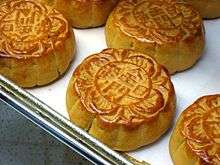Bo Bing (game)
Bo Bing (also known as Po̍ah-chiōng-gôan-piáⁿ 博狀元餅 or Po̍ah-piáⁿ 博餅) is a Chinese dice game traditionally played as part of the celebration of the Mid-Autumn Festival. It is traditionally played with six dice and a china bowl.
Six dice in a bowl: a roll of 1-2-3-4-5-6 is a Bangyan, and its prize is the second largest mooncake | |
| Other name(s) | Po̍ah-(chiōng-gôan)-piáⁿ Poa̍h-tiong-chhiu |
|---|---|
| Years active | 17th century - present |
| Genre(s) | Dice game |
| Players | 2+ |
| Random chance | High |
| Material(s) required | Six dice, a bowl |
The game dates back to the 1600s when it is said to have been invented by the Chinese general Koxinga of the Southern Ming, along with his lower officer Hong Xu. Zheng was stationed with his troops in Amoy planning the Siege of Fort Zeelandia to take Dutch Formosa, which had been occupied by the Europeans since 1624. The game was an attempt to boost the morale of Tinn's homesick troops during the Mid-Autumn Festival.[1] The game became popular in Amoy and is considered a folk game.
The Chinese name Po̍ah-piáⁿ translates as "gambling for cakes", and the game traditionally has 63 different sized mooncakes as prizes for the winning players: 32 of the smallest cake, half as many of the next largest, and so on ending with a single large Chiōng-gôan cake.[1] In modern times, the game's instructions are often printed on mooncake packaging, although the game is also played with prizes of daily necessities, household appliances or money.[1]
In the Philippines, the game is known as Poa̍h-tiong-chhiu 拔中秋 among the Chinese Filipino community.[2]
Rules
The game requires six dice and a wide mouthed bowl. The first player is assigned and rolls the dice, and wins a specific prize depending on the dice combination. The dice are then passed to the next person, and the process is repeated until there are no prizes left.[3] A throw is declared invalid if at least one of the dice lands outside the bowl.[2]
| Prize | Combination name | Number of cakes available | Dice results | ||
|---|---|---|---|---|---|
| Mandarin | Philippine Hokkien | ||||
| 6th place | 一秀
yī xiù |
一秀
it-siù |
32 | A 4-face, any number for the five remaining dices. | |
| 5th place | 二举
èr jǔ |
二舉
dī-kú |
16 | Two 4-face, any number for the four remaining dices. | |
| 4th place | 四进
sì jìn |
四進
sù-tsìn |
8 | Four of the same number except four | |
| 3rd place | 三红
sān hóng |
三紅
sam-hông |
4 | Three 4-face, any number for the three remaining dices. | |
| 2nd place | 对堂
duì táng |
對堂
tuì-tng |
2 | All numbers (1,2,3,4,5,6), or three of a number and three of another number. | |
(Example, Three of two numbers) | |||||
| 1st place | 状元
zhuàngyuán |
狀元
chiōng-gôan |
1 | Four 4-face, or five of any number | |
| Ultimate Throw | Six 1-face or Six 4-face | ||||
| A blank dice denotes a result of any number outside the given exceptions | |||||

If a player makes an ultimate throw, they receive all of the other mooncakes designated for 6th to 1st place, even those which were already awarded. This rule can be omitted to ensure all players receive a prize.[3]
Rituals
Some players believe in rituals when playing the game that they believe will give them good luck. Reported practices includes throwing the dice with one or two hands, or exclaiming "Chiong Wan!"[2]
References
- "Mooncake gambling odds-on festival favourite". China Daily. 28 September 2008. Retrieved 29 January 2017.
- See, Stanley Baldwin (17 September 2015). "Playing the Mooncake Festival's centuries-old dice game". GMA News. Retrieved 29 January 2017.
- "Chinese Moon Festival Dice Game" (PDF). Westchester Association of Chinese Americans. Retrieved 29 January 2017.
